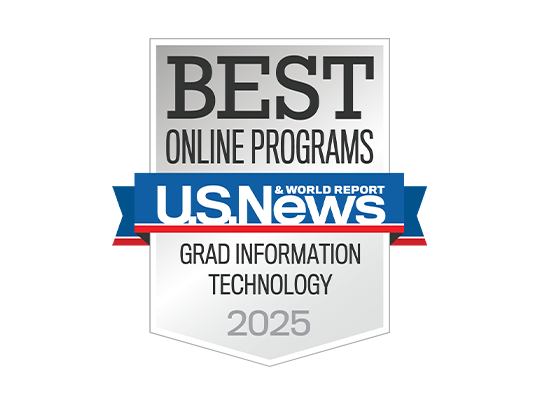Prepare for Critical Data Analytics Roles
Available online and on campus, the Master of Science in Applied Data Analytics (MSADA) at Boston University’s Metropolitan College (MET) is a hands-on program that exposes you to various database systems, data mining tools, data visualization tools and packages, Python packages, R packages, and cloud services. The knowledge of analytics tools combined with an understanding of data mining and machine learning approaches will enhance your ability to critically analyze real-world problems and understand the possibilities and limitations of analytics applications.
Program at a Glance
- Online and On Campus
- Part-Time or Full-Time Study
- STEM Designated
- 32 Credits
- 8–16 Months to Completion
- 17 Core Faculty
- No GRE/GMAT
- Tuition & Fees—Part-Time Study*: $27,204
*Based on 2025–2026 Boston University tuition and fees. Merit scholarship may reduce cost.
Advance Your Career with a Master’s in Applied Data Analytics
With data analytics needs influencing every major industry—including healthcare, tech, finance, communication, entertainment, energy, transportation, government, and manufacturing, to name some—there is significant growth in specialized data science, data engineering, automation, AI, and machine learning areas. Yet the demand for skilled talent continues to outpace supply. QuantHub research confirms a shortfall of 250,000 data scientists in 2020, while McKinsey Global Institute anticipates as much as 12 percent annual growth in demand for graduates from data science programs over the next decade.
To harness the potential of this big data revolution, you need advanced techniques.
As a graduate of the MS in Applied Data Analytics program at BU MET, you will be able to demonstrate the ability to create powerful predictions through modeling and machine learning, and drive critical business decisions—skills needed to excel in a growing list of roles such as data scientist, economist, data analyst, business intelligence analyst, systems analyst, chief analytics officer, analytics manager, marketing analyst, business analyst, or financial analyst, among others.

#10, Best Online Master's in Computer Information Technology Programs
MET’s online master’s degrees in computer information technology are ranked #10 in the nation by U.S. News & World Report for 2025.
Learn More
Computer Science Career Outlook
Top computer science careers in data science, software development, and other popular areas of IT.
Learn moreWhat Is My Career Outlook as a Graduate of This Program?
404,587
Total number of US Jobs
53,424
Annual job openings
+3%
Annual job openings
35%
Projected ten-year growth in jobs
(faster than average)
$100.4K
Median annual salary
Common job titles include:
- Data Scientist
- Data Analyst
- Program Analyst
- Statistical Programmer
- Programmer Analyst
Employers seek expertise in:
- Data analysis
- Python
- SQL
- R

“This program led me to my current position as a data scientist at Boston’s Massachusetts General Hospital, where I implement machine learning models to improve the hospital’s operational efficiency and support physicians with clinical research. I am immensely happy with my investment in graduate school, as it led me to many amazing opportunities!” Read more.
Melissa Viator (MET'23)
Data Scientist, Massachusetts General Hospital
MS, Applied Data Analytics
Why BU’s Applied Data Analytics Master’s is Ranked in the Top 10
- Active Learning Environment: BU MET’s Applied Data Analytics courses ensure you get the attention you need, while introducing case studies and real-world projects that ensure you gain in-depth, practical experience with the latest technologies.
- Career Counseling: MET’s Career Development office and BU’s Center for Career Development offer a variety of job-hunting resources, including one-on-one career counseling by appointment for both online and on-campus students.
- Engaged Faculty: In BU MET’s Applied Data Analytics master’s program, you benefit from working closely with highly qualified faculty and industry leaders who have substantial backgrounds and achievements in data analytics, data science, data storage technologies, cybersecurity, artificial intelligence (AI), machine learning, software development, and many other areas.
- Extensive Network: Study Applied Data Analytics alongside fellow professionals from all backgrounds, learn from faculty who have valuable IT contacts across several sectors, and benefit from an alumni community with strong professional connections.
- STEM Designated: Eligible graduates on student visas have access to an Optional Practical Training (OPT) of 12 months and an extension for up to 24 additional months.
- 15:1 Class Ratio: Enjoy an exceptional student-to-instructor ratio, ensuring close interaction with faculty and access to support.
- Valuable Resources: Make use of Boston University’s extensive resources, including the Center for Career Development, Educational Resource Center, Fitness & Recreation Center, IT Help Centers, Mugar Memorial Library, Howard Thurman Center for Common Ground, George Sherman Union, Rafik B. Hariri Institute for Computing and Computational Science & Engineering, and many others.
- Flexible Options: Study at the pace that works for you, evenings on campus or fully online. Courses begin fall, spring, and summer; online courses have two starts per term.
- Track Record: Learn from the best—BU MET’s Department of Computer Science was established in 1979 and is the longest-running computer science department at BU. Over its four decades, the department has played an important role in the emergence of IT at the University and throughout the region.
- Merit Scholarships: US citizens and permanent residents are automatically considered during the application process and nominated based on eligibility. Learn more.
Master the Tools to Excel in Applied Data Analytics
Offered through BU MET’s Department of Computer Science, the Master of Science in Applied Data Analytics can set you apart by adding invaluable analytics expertise, skills, and projects to your résumé.
Ideal for mid-career IT professionals or students, BU MET’s Applied Data Analytics curriculum provides solid knowledge of data analytics and examines the presentation and applications of the latest industry tools and approaches within an academically rigorous framework. Emphasizing both data analytics and applied areas—including databases, applied machine learning, and large dataset processing methods—the Applied Data Analytics master’s curriculum provides a thorough immersion in concepts and techniques for organizing, cleaning, analyzing, and representing/visualizing large amounts of data.
Graduate with Expertise
Metropolitan College’s Applied Data Analytics master’s degree will equip you with:
- Knowledge of the foundations of applied probability and statistics and their relevance in day-to-day data analysis.
- Comprehension of computing concepts and application requirements involving massive computing needs and data storage.
- The ability to apply various data visualization techniques using real-world data sets and analyze the graphs and charts.
- Understanding of web analytics and metrics, procuring and processing unstructured text/data, and the ability to investigate hidden patterns.
- Knowledge-discovery skills using data mining techniques and tools over large amounts of data.
- The ability to implement machine learning algorithms and recognize their pertinence in real-world applications.
- Comprehensive knowledge of data analytics techniques, skills, and critical thinking, and an understanding of the possibilities and limitations of their applications.
Certificate-to-Degree Pathway
BU MET graduate certificate programs can serve as building blocks to a master’s degree. The Graduate Certificate in Data Analytics and Graduate Certificate in Database Management & Business Intelligence share specific courses with the master’s in Applied Data Analytics program, giving you the option to take the certificate on your path to a master’s degree. Students currently enrolled in a graduate certificate who are interested in transitioning into a master’s degree should contact their academic advisor to declare their interest in this pathway. A new master’s degree application is not required. Connect with a graduate admissions advisor at csadmissions@bu.edu to learn more about this option.
Master’s in Applied Data Analytics Curriculum
A total of 32 credits is required.
Core Curriculum
(Six courses/24 credits)
MET CS 544 Foundations of Analytics and Data Visualization
MET CS 555 Foundations of Machine Learning
MET CS 566 Analysis of Algorithms
MET CS 677 Data Science with Python
MET CS 688 Web Mining and Graph Analytics
MET CS 699 Data Mining
General Electives
(Two courses/8 credits)
Choose two electives from the following list (some courses may not be available in the online format):
MET CS 550 Computational Mathematics for Machine Learning
MET CS 689 Designing and Implementing a Data Warehouse
MET CS 767 Advanced Machine Learning and Neural Networks
MET CS 777 Big Data Analytics
MET CS 779 Advanced Database Management
Computer Science Faculty
View All Faculty
Tuition & Financial Assistance
Competitive Tuition
Our part-time rates are substantially lower than those of the traditional, full-time residential programs yet provide access to the same high-quality BU education.Comprehensive Financial Assistance
Our services include scholarships, graduate loans, and payment plans.How Much Does This Program Cost?
BU MET programs offer the flexibility of part-time or full-time study, either on campus or online. Tuition, fees, and total program cost are determined by enrollment status. If you enroll in 1–2 courses (4–8 credits) in a semester, you are charged the part-time per-credit rate. If you enroll in 3–4 courses (12–16 credits) in a semester, you are charged the full-time semester rate.
MS in Applied Data Analytics (Online and On Campus)
| Enrollment Status | Part Time | Full Time | |
| Courses per Semester | 2 courses (8 credits) |
4 courses (16 credits) |
3 courses (12 credits) |
| Time to Degree | 4 semesters (16 months) |
2 semesters (8-12 months)*** |
3 semesters (12-16 months)*** |
| Tuition* | $567-$1,005 per credit** |
$34,935 per semester |
$34,935 per semester |
| Fees per Semester* | $75 | $501 | $501 |
| Total Degree Cost* | $27,204 | $70,872 | $78,987 |
*Based on 2025–2026 Boston University tuition & fee rates.
**Cost per credit is determined by course number (100–599 = $567/credit, 600–999 = $1,005/credit).
***Summer semester enrollment is not required for international students to maintain F-1 visa status. Enrollment in summer semester coursework will expedite completion of program and reduce total program cost.
International students seeking an F-1 visa for on-campus study must enroll full time and demonstrate availability of funds to cover the Estimated Cost of Graduate Study; those who wish to study online may enroll part-time but are not eligible for a visa. Learn more about International Student Tuition & Fees.
Questions? Please contact us to hear from an Admissions Advisor who can help you determine the best enrollment pathway. For information regarding financial aid, visit BU MET’s Financial Aid page.

Get Started
Please visit the BU MET admissions page for details on how to apply, financial assistance, tuition and fees, requirements for international students, and more.
What to Read Next: MET Computer Science & IT Knowledge Center
- Computer Science & IT Student Stories
- How Long Does a Master’s in Computer Science Take to Complete—and What is the Cost?
- Why Get a Master’s Degree in Computer Science at BU MET?
- What Do My Career Options Look Like with a Master’s in Computer Science from BU’s Metropolitan College?
- Are There Different Computer Science Graduate Programs or Specializations at BU?




















